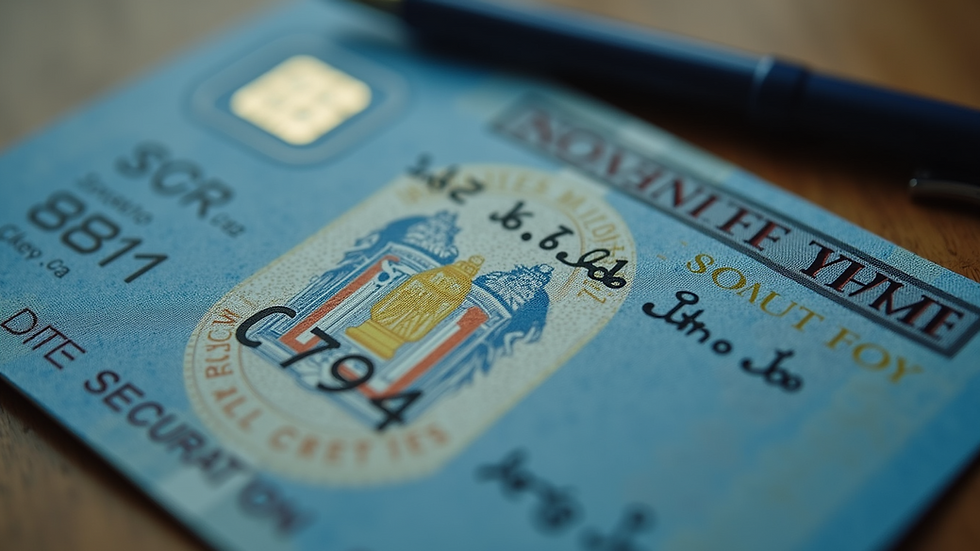How to Start a Career as a Security Officer
- DEFENDER87

- Aug 11, 2025
- 4 min read
Starting a career as a security officer can be a rewarding choice for those who want to protect people and property. This profession offers a variety of opportunities in different industries, from retail and corporate offices to event venues and government facilities. If you are interested in becoming a security officer, it is important to understand the steps involved, the skills required, and how to prepare yourself for this role.
Understanding the Security Career Path
A security career involves more than just standing guard or monitoring cameras. Security officers play a crucial role in maintaining safety, preventing crime, and responding to emergencies. The job can include tasks such as patrolling premises, checking identification, writing reports, and sometimes managing access control systems.
There are different levels within the security field, including entry-level security guards, armed officers, and specialized roles like cybersecurity or executive protection. Many security officers start with basic training and gain experience before moving into more advanced positions.
Key skills for a security career include:
Attention to detail
Good communication
Physical fitness
Problem-solving abilities
Ability to stay calm under pressure
Security officers often work irregular hours, including nights, weekends, and holidays. Flexibility and reliability are important traits for success in this field.

Steps to Launch Your Security Career
Starting your career as a security officer involves several important steps. Here is a practical guide to help you get started:
Research the Job Requirements
Different states and employers have varying requirements for security officers. Some require a license or certification, while others may only need a high school diploma or equivalent.
Complete Necessary Training
Most security jobs require some form of training. This can include courses on legal powers, emergency procedures, and communication skills. For those interested in armed security, additional firearms training is mandatory. You can find comprehensive security officer training programs that cover these essentials.
Obtain a Security License
Licensing is often required by law and ensures you meet the standards for the profession. This process usually involves background checks, fingerprinting, and passing an exam.
Apply for Jobs
Look for openings in your area through job boards, company websites, or staffing agencies specializing in security personnel.
Gain Experience and Advance
Once hired, focus on gaining experience and building a good reputation. This can lead to promotions or specialized roles.
Tips for success:
Maintain a professional appearance
Develop strong observation skills
Stay physically fit
Keep learning about new security technologies and practices

How do I get my security license in NY?
If you want to work as a security officer in New York, obtaining a security license is a crucial step. The New York State Division of Criminal Justice Services (DCJS) regulates security licensing. Here is how you can get your security license in NY:
Meet Basic Eligibility
You must be at least 18 years old, have no felony convictions, and be legally allowed to work in the US.
Complete the Required Training
New York requires a 8-hour pre-assignment training course for unarmed security guards and additional training for armed guards. This training covers topics such as powers of arrest, emergency procedures, and legal responsibilities.
Submit an Application
Apply through the DCJS website or authorized training providers. You will need to provide fingerprints and pay the application fee.
Pass a Background Check
The DCJS will conduct a criminal background check to ensure you meet the standards.
Receive Your License
Once approved, you will receive your security guard registration card, which you must carry while on duty.
Renewal of the license is required every two years, with continuing education to keep your skills up to date.

Essential Qualities and Skills for Security Officers
To excel in a security career, certain qualities and skills are essential. Employers look for candidates who can handle the responsibilities with professionalism and care.
Observation and Attention to Detail
Being alert to unusual behavior or potential threats is critical. Security officers must notice small details that others might miss.
Communication Skills
Clear communication with colleagues, law enforcement, and the public is necessary. Writing detailed incident reports is also part of the job.
Physical and Mental Fitness
The role can be physically demanding, requiring standing for long periods or responding quickly to emergencies. Mental resilience helps in stressful situations.
Integrity and Trustworthiness
Security officers often have access to sensitive areas and information. Employers need to trust that you will act ethically.
Problem-Solving Abilities
Quick thinking and the ability to de-escalate conflicts can prevent incidents from escalating.
Developing these skills through training and experience will help you build a successful security career.
Career Advancement Opportunities in Security
A security career offers many paths for growth and specialization. After gaining experience as a security officer, you can explore various options:
Supervisory Roles
Become a team leader or shift supervisor, managing other security personnel.
Specialized Security
Work in areas like executive protection, event security, or loss prevention.
Armed Security
With additional training and licensing, you can become an armed security officer.
Security Management
Move into management positions overseeing security operations for companies or facilities.
Technology and Cybersecurity
Some security professionals transition into roles involving security systems, surveillance technology, or cybersecurity.
Continuing education and certifications can open doors to these advanced roles. Networking with other professionals and joining industry associations can also provide valuable opportunities.
Starting a career as a security officer is a practical and achievable goal with the right preparation. By understanding the requirements, completing proper training, and developing key skills, you can build a fulfilling career protecting people and property. Whether you aim to work in New York or elsewhere, following these steps will set you on the path to success in the security field.








Comments